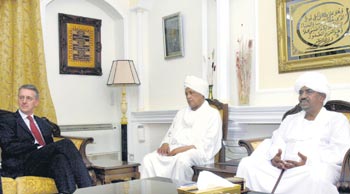
| The rebellion of UN slaves NEW YORK - In Greek mythology, the oracle was a high priest or perhaps a low priestess (shades of reverse gender discrimination?) who spoke with absolute authority, and perhaps by divine inspiration. When the oracle spoke, no one challenged that final and apparently mighty authority. The oracle always had the last word. When the Pope recently expressed his regrets over a statement he made about Prophet Muhammad, even the longstanding myth about papal infallibility was shattered to smithereens. The Pope, after all, was no longer infallible. A variation of Alexander Pope's famous dictum plastered on the wall of a state-run institution in New York reads: to err is human, to forgive is against governmental regulations.
The 15-member UN Security Council, which is dominated and manipulated by its five veto-powered permanent members, namely the US, France, Russia, China and Britain, is the most powerful body in the Organisation. Like the Oracle, it has always had the last word. So, when it imposes economic and military sanctions, all of the 192 members of the United Nations have to fall in line — whether they like it or not. The authority of the Security Council is mandatory. And there are no "ifs" and "buts". Even when the Security Council traditionally recommends a candidate for the appointment of a new Secretary-General, it recommends only a single name. The General Assembly, which eventually makes the appointment, has no choice. As it has happened over the last 61 years, the Assembly merely rubber-stamps the recommendation and never challenges the Security Council. Another political mockery of our times. A recent proposal — demanding that the Security Council send a slate of at least three names (instead of one) so that the General Assembly can have a final say in the real selection of the Secretary-General-— failed to make any headway because of the strong opposition by the permanent five. So, it is now heartening to discover that the power of the Security Council is being gradually — and publicly — challenged. As we pointed out in these columns last month, the most persuasive challenge came from the Iranian President Mahmoud Ahamadinejad whose statement to the General Assembly has received widespread publicity. At least he had the courage of his political convictions to challenge the Big Five — something most heads of state dare not, with the exception of the perennially outspoken former Malaysian Prime Minister Mahathir Mohamad. "If the governments of the United States or the United Kingdom, who are permanent members of the Security Council, commit aggression, occupation and violation of international law, which of the organs of the United Nations can take them to account?," the Iranian president asked. "Can a Council in which they are privileged members address their violations? Has this ever happened before?" he asked. The answer: Never. Last week, rather ironically, it was the turn of the one of the five permanent members, namely China, to defy a resolution of the Security Council. The resolution under challenge, relating to economic and military sanctions on North Korea as a punishment for its nuclear tests, was approved by all 15 members of the Security Council, including China. The resolution authorises all 192 member states to inspect cargo going in and out of North Korea, primarily to detect the transfer of weapons of mass destruction. Although the implementation of the resolution is mandatory, China has publicly expressed reservations about it. The implication is that China supports the adoption of the resolution to please the US, Britain and France, but refuses to implement it to please North Korea, one of its longstanding political, economic and military allies in the region. Currently, China accounts for nearly 40 percent of all Pyongyang's imports and exports. Chinese Ambassador Wang Guangya told reporters the proposed inspections — aimed at preventing illicit trafficking in nuclear, biological and chemical weapons — could create "conflict that could have serious implications for the region." Just after the resolution was adopted, the Chinese envoy told delegates that "sanctions were not the end in themselves." He said China did not approve of the practice of inspecting cargo to and from North Korea, and he had reservations about related provisions of the resolution. The defiance of the Security Council also coincides with a similar challenge by the President of Sudan Omar Hassan Al-Bashir, whose government is facing genocide charges in Darfur. He has publicly said that he will not permit a proposed 20,000-strong UN peacekeeping force into his country — rejecting "categorically and totally" a resolution adopted last month by the Security Council. US President George W. Bush has already responded strongly to Sudan's challenge. "If the Sudanese government does not approve this peacekeeping force quickly, the United Nations must act," he said last week. But what higher authority does the UN have besides the all-powerful Security Council? Last week Sudan went even further in its challenge. The Sudanese president warned member states that if they contribute troops to the proposed UN peacekeeping force, Sudan will consider it a "hostile act" against a sovereign member state — and "a prelude to an invasion of a member country of the UN." The metaphor may be misplaced and politically incorrect: but is there a beginning of a possible revolt of the slaves at the United Nations? |
| || Front
Page | News
| Editorial
| Columns
| Sports
| Plus
| Financial
Times | International
| Mirror
| TV
Times | Funday
Times | |
| |
Copyright
2006 Wijeya
Newspapers Ltd.Colombo. Sri Lanka. |
